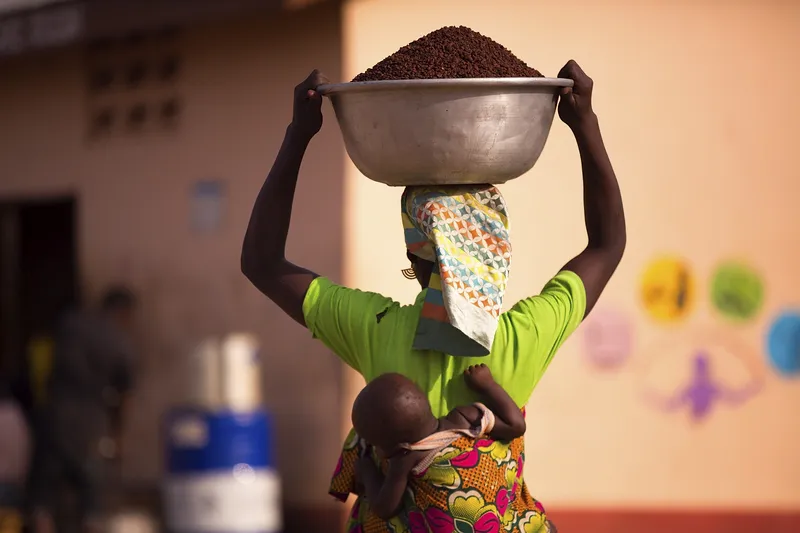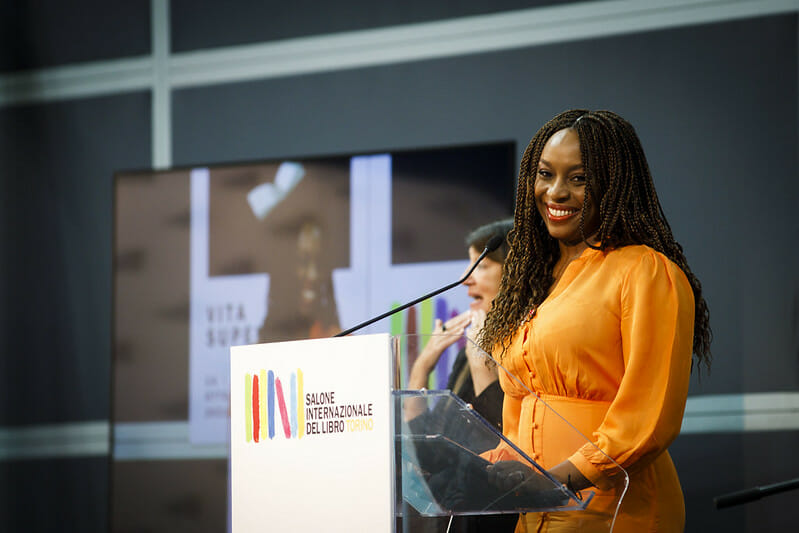
The Girl with the Louding Voice | A cry for freedom
Author
Year
Format
By
Poverty, child marriage, domestic slavery, and the right to an education are the central themes of The Girl with the Louding Voice (2020), Abimbola ‘Abi’ Daré’s debut novel. These are issues that other authors have lengthily discussed, yet, through the voice of her 14-year-old protagonist Adunni, the author manages to lend a new perspective.
Daré was born and raised in Lagos, Nigeria, the daughter of the country’s first female professor of taxation. In the same way as other novelists from the African continent such as Ngozi Adichie, Abdulrazak Gurnah, and Imbolo Mbue, she emigrated to the United Kingdom to pursue her higher education. Alongside her legal studies, she also developed a penchant for creative writing. The Girl with the Louding Voice testifies to her ability to probe into the depths of her characters, and to give back a transparent and outspoken representation of the real. Thanks to its captivating writing style and story, before it was published, the novel won the 2018 Bath Novel Award for debut writers and then became a New York Times Bestseller.
A unique language
The Girl with the Louding Voice is set in a small Nigerian village, several hours’ drive from Lagos. Adunni is both the main character and the narrator. What strikes the reader from the first pages of the story is the unique narrative voice. Her non-standard English and imaginative vocabulary cannot but impress readers. It differs, in fact, from other instances of pidgin English used in literature, such as in A Man of the People by Chinua Achebe or Death and the King’s Horseman by Wole Soyinka. Rather than pidgin, it is a broken and creative English which does not hinder comprehension. As Adunni claims in the novel:
We all be speaking different because we all are having different growing-up life, but we can all be understanding each other if we just take the time to listen well.
Listening to her “louding voice” is not hard because her story is gripping and emotional. The novel opens with Adunni’s father telling her that she cannot pursue her education as she had hoped, because she ought to become the third wife of a much older man to pay the family’s debts. Her sorrow and despair are profound but she cannot oppose the decision. Her marriage, however, proves even more dreadful than she had imagined. Morufu, her husband, is violent and aggressive and his first wife is spiteful and vindictive. After a series of unfortunate events, Adunni is obliged to run away.
A story of domestic slavery
The second part of the story sees Adunni in Lagos, working for Big Madam, a rich businesswoman dealing in luxury fabrics for the Nigerian élite:
When [Big Madam] come out, she draw deep breath and her chest, wide like blackboard, is climbing up and down, up and down. It is as if this woman is using her nostrils to be collecting all the heating from the outside and making us to be catching cold.
Big Madam, aka Florence, bosses Adunni around and makes her work from dawn till late at night; she often kicks, slaps and verbally abuses her, to the point of causing severe injuries to the 14-year-old girl. Her salary goes directly into the hands of a child trafficker: she is, in other words, a domestic slave. According to a 2015 article by The Globalist, Nigeria has “the continent’s largest number of people living in conditions of modern slavery”, part of which consists of unpaid household workers. However, Adunni has other plans for her life:
That day, I tell myself that even if I am not getting anything in this life, I will go to school. I will finish my primary and secondary and university schooling and become teacher because I don’t just want to be having any kind voice…I want a louding voice.
A coming-of-age journey
Education is a pressing theme in Daré’s novel: it is both the protagonist’s dream, and her only escape from a life of toil and violence. Adunni would agree with novelist Ngozi Adichie when she claims that “literature teaches us that there is so much that we don’t know and so much we have yet to know”. Books are for Adunni her gateway to a better future. She covertly starts reading books from the private library of Big Madam’s husband. Her reading goes from the English dictionary to The Book of Nigerian Facts. But that is not enough.
The turning point coincides with the arrival of a new neighbour, Ms Tia. Born in Port Harcourt and educated in the UK, Tia is the prototype of the passionate, but at times naive, environmentalist. She brings in a Western kind of life, and Western ideals, that seem not to fit in the superstitious, conservative and exploitative niche of the Nigerian élite. Whether this contraposition between Nigeria and the UK is positive or disturbing, it is up to the readers to decide. What is certain is that it is only thanks to Tia, that Adunni manages to find the strength to pursue her dreams.
Like Thula’s in Mbue‘s How Beautiful We Were, Adunni’s is also a coming-of-age journey. They both battle to find their own space and voice in an exploitative and conservative society, which puts profit before people, and wealth before justice. They also articulate “a resounding anger toward Africa’s toxic patriarchy”, as Tsitsi Dangarembga writes in a NY Times review of Daré’s novel. Adunni is perfectly aware of gender inequality issues; and that is why she wants to be the one to tell her story, with her own, unique voice:
‘Not his-story,’ I say. ‘My own will be called her-story. Adunni’s story.’
Tag
Buy a ☕ for Hypercritic








